Үстеулер "Adverbs"
Үстеулер "Adverbs"
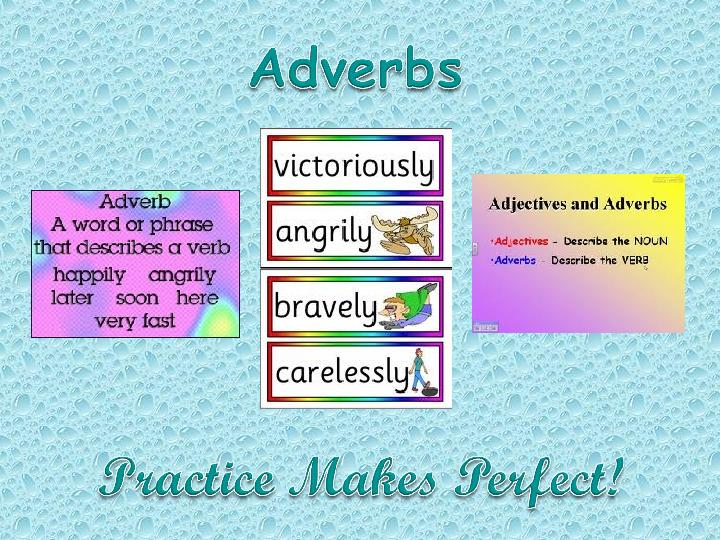

#1 слайд
1 слайд
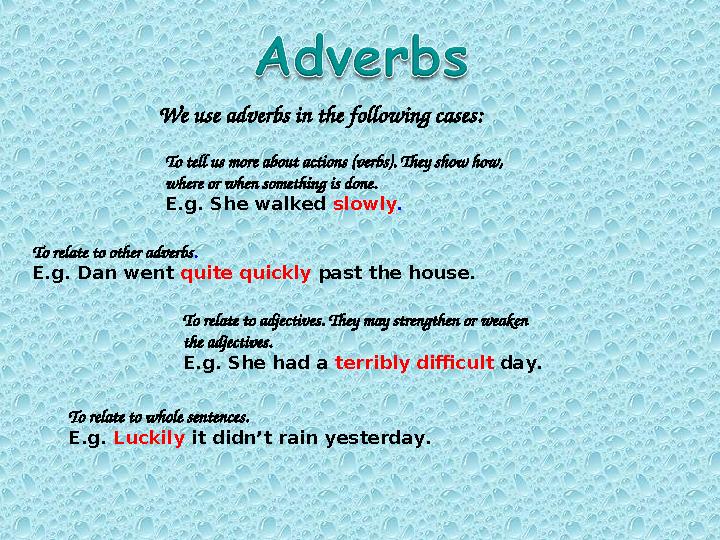
#2 слайд
We use adverbs in the following cases:
To tell us more about actions (verbs). They show how,
where or when something is done.
E.g. She walked slowly.
To relate to other adverbs.
E.g. Dan went quite quickly past the house.
To relate to adjectives. They may strengthen or weaken
the adjectives.
E.g. She had a terribly difficult day.
To relate to whole sentences.
E.g. Luckily it didn’t rain yesterday.
2 слайд
We use adverbs in the following cases: To tell us more about actions (verbs). They show how, where or when something is done. E.g. She walked slowly. To relate to other adverbs. E.g. Dan went quite quickly past the house. To relate to adjectives. They may strengthen or weaken the adjectives. E.g. She had a terribly difficult day. To relate to whole sentences. E.g. Luckily it didn’t rain yesterday.
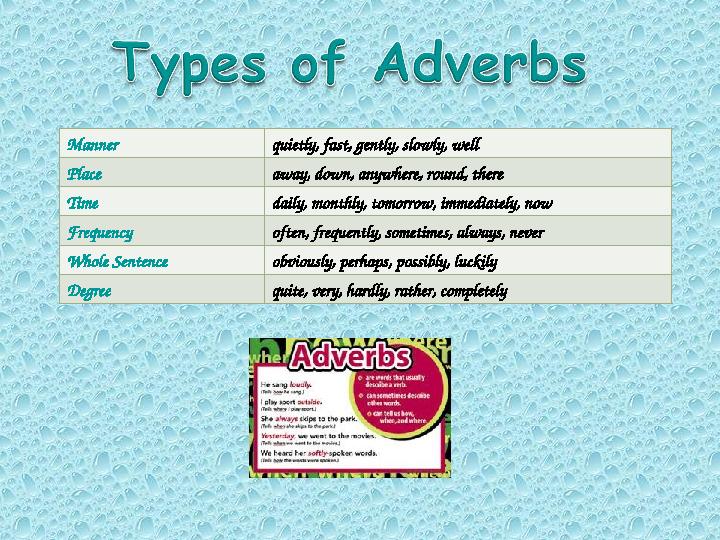
#3 слайд
Manner quietly, fast, gently, slowly, well
Place away, down, anywhere, round, there
Time daily, monthly, tomorrow, immediately, now
Frequency often, frequently, sometimes, always, never
Whole Sentence obviously, perhaps, possibly, luckily
Degree quite, very, hardly, rather, completely
3 слайд
Manner quietly, fast, gently, slowly, well Place away, down, anywhere, round, there Time daily, monthly, tomorrow, immediately, now Frequency often, frequently, sometimes, always, never Whole Sentence obviously, perhaps, possibly, luckily Degree quite, very, hardly, rather, completely
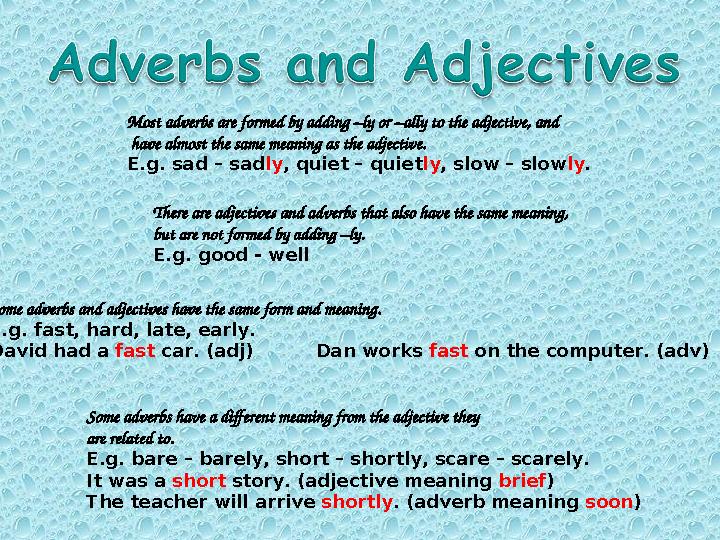
#4 слайд
Most adverbs are formed by adding –ly or –ally to the adjective, and
have almost the same meaning as the adjective.
E.g. sad – sadly, quiet – quietly, slow – slowly.
There are adjectives and adverbs that also have the same meaning,
but are not formed by adding –ly.
E.g. good - well
Some adverbs and adjectives have the same form and meaning.
E.g. fast, hard, late, early.
David had a fast car. (adj) Dan works fast on the computer. (adv)
Some adverbs have a different meaning from the adjective they
are related to.
E.g. bare – barely, short – shortly, scare – scarely.
It was a short story. (adjective meaning brief)
The teacher will arrive shortly. (adverb meaning soon)
4 слайд
Most adverbs are formed by adding –ly or –ally to the adjective, and have almost the same meaning as the adjective. E.g. sad – sadly, quiet – quietly, slow – slowly. There are adjectives and adverbs that also have the same meaning, but are not formed by adding –ly. E.g. good - well Some adverbs and adjectives have the same form and meaning. E.g. fast, hard, late, early. David had a fast car. (adj) Dan works fast on the computer. (adv) Some adverbs have a different meaning from the adjective they are related to. E.g. bare – barely, short – shortly, scare – scarely. It was a short story. (adjective meaning brief) The teacher will arrive shortly. (adverb meaning soon)
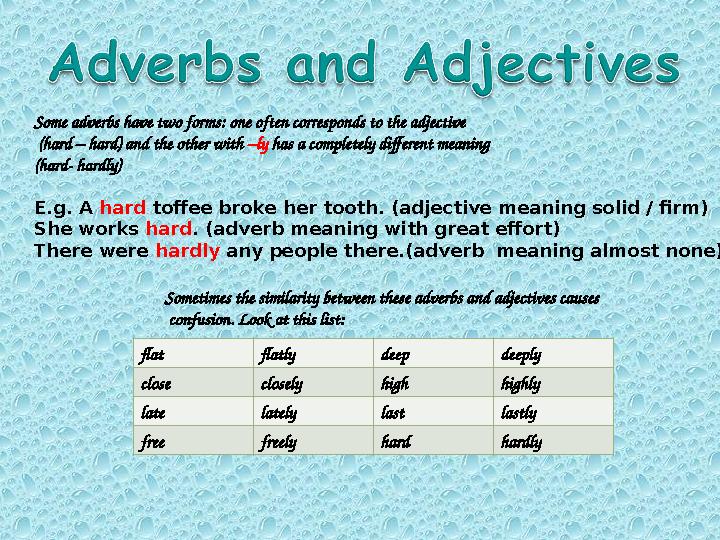
#5 слайд
Some adverbs have two forms: one often corresponds to the adjective
(hard – hard) and the other with –ly has a completely different meaning
(hard- hardly)
E.g. A hard toffee broke her tooth. (adjective meaning solid / firm)
She works hard. (adverb meaning with great effort)
There were hardly any people there.(adverb meaning almost none)
Sometimes the similarity between these adverbs and adjectives causes
confusion. Look at this list:
flat flatly deep deeply
close closely high highly
late lately last lastly
free freely hard hardly
5 слайд
Some adverbs have two forms: one often corresponds to the adjective (hard – hard) and the other with –ly has a completely different meaning (hard- hardly) E.g. A hard toffee broke her tooth. (adjective meaning solid / firm) She works hard. (adverb meaning with great effort) There were hardly any people there.(adverb meaning almost none) Sometimes the similarity between these adverbs and adjectives causes confusion. Look at this list: flat flatly deep deeply close closely high highly late lately last lastly free freely hard hardly
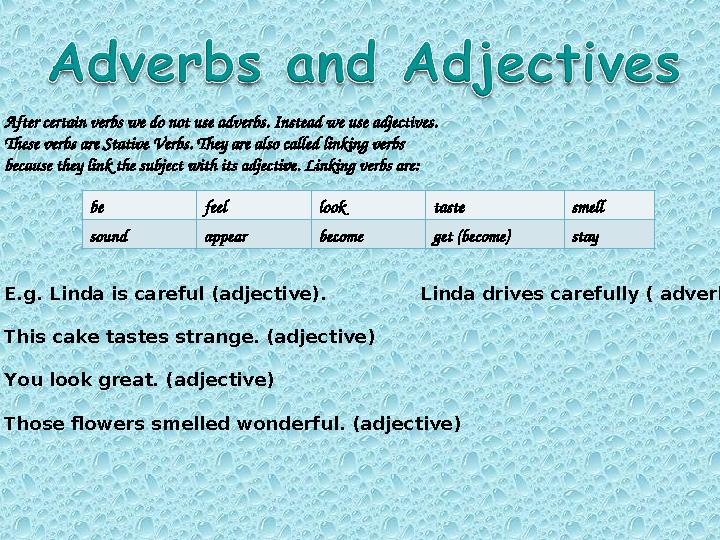
#6 слайд
After certain verbs we do not use adverbs. Instead we use adjectives.
These verbs are Stative Verbs. They are also called linking verbs
because they link the subject with its adjective. Linking verbs are:
E.g. Linda is careful (adjective). Linda drives carefully ( adverb)
This cake tastes strange. (adjective)
You look great. (adjective)
Those flowers smelled wonderful. (adjective)
be feel look taste smell
sound appear become get (become)stay
6 слайд
After certain verbs we do not use adverbs. Instead we use adjectives. These verbs are Stative Verbs. They are also called linking verbs because they link the subject with its adjective. Linking verbs are: E.g. Linda is careful (adjective). Linda drives carefully ( adverb) This cake tastes strange. (adjective) You look great. (adjective) Those flowers smelled wonderful. (adjective) be feel look taste smell sound appear become get (become)stay
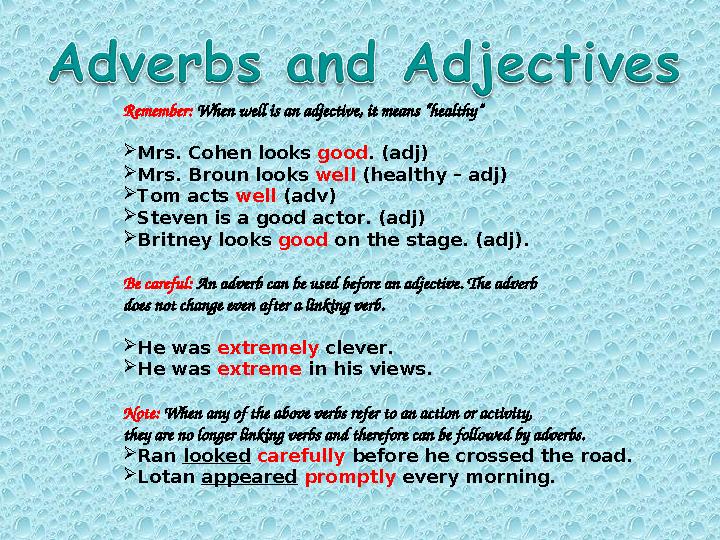
#7 слайд
Remember: When well is an adjective, it means “healthy”
Mrs. Cohen looks good. (adj)
Mrs. Broun looks well (healthy – adj)
Tom acts well (adv)
Steven is a good actor. (adj)
Britney looks good on the stage. (adj).
Be careful: An adverb can be used before an adjective. The adverb
does not change even after a linking verb.
He was extremely clever.
He was extreme in his views.
Note: When any of the above verbs refer to an action or activity,
they are no longer linking verbs and therefore can be followed by adverbs.
Ran looked carefully before he crossed the road.
Lotan appeared promptly every morning.
7 слайд
Remember: When well is an adjective, it means “healthy” Mrs. Cohen looks good. (adj) Mrs. Broun looks well (healthy – adj) Tom acts well (adv) Steven is a good actor. (adj) Britney looks good on the stage. (adj). Be careful: An adverb can be used before an adjective. The adverb does not change even after a linking verb. He was extremely clever. He was extreme in his views. Note: When any of the above verbs refer to an action or activity, they are no longer linking verbs and therefore can be followed by adverbs. Ran looked carefully before he crossed the road. Lotan appeared promptly every morning.
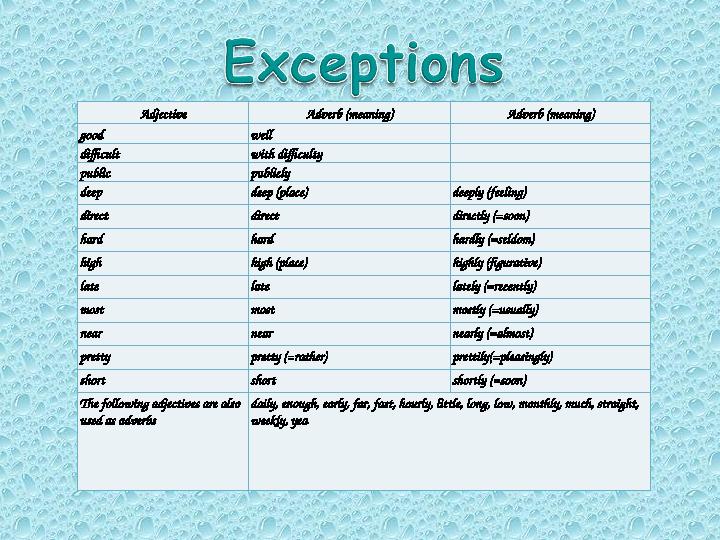
#8 слайд
Adjective Adverb (meaning) Adverb (meaning)
good well
difficult with difficulty
public publicly
deep deep (place) deeply (feeling)
direct direct directly (=soon)
hard hard hardly (=seldom)
high high (place) highly (figurative)
late late lately (=recently)
most most mostly (=usually)
near near nearly (=almost)
pretty pretty (=rather) prettily(=pleasingly)
short short shortly (=soon)
The following adjectives are also
used as adverbs
daily, enough, early, far, fast, hourly, little, long, low, monthly, much, straight,
weekly, yea
8 слайд
Adjective Adverb (meaning) Adverb (meaning) good well difficult with difficulty public publicly deep deep (place) deeply (feeling) direct direct directly (=soon) hard hard hardly (=seldom) high high (place) highly (figurative) late late lately (=recently) most most mostly (=usually) near near nearly (=almost) pretty pretty (=rather) prettily(=pleasingly) short short shortly (=soon) The following adjectives are also used as adverbs daily, enough, early, far, fast, hourly, little, long, low, monthly, much, straight, weekly, yea
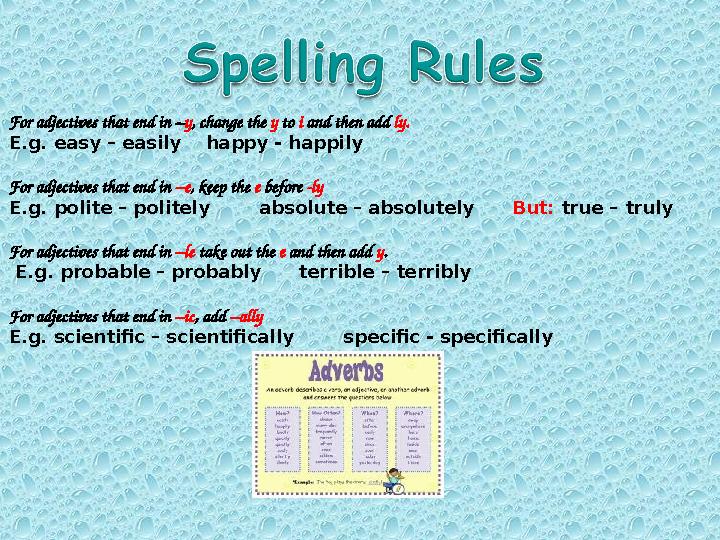
#9 слайд
For adjectives that end in –y, change the y to i and then add ly.
E.g. easy – easily happy - happily
For adjectives that end in –e, keep the e before -ly
E.g. polite – politely absolute – absolutely But: true – truly
For adjectives that end in –le take out the e and then add y.
E.g. probable – probably terrible – terribly
For adjectives that end in –ic, add –ally
E.g. scientific – scientifically specific - specifically
9 слайд
For adjectives that end in –y, change the y to i and then add ly. E.g. easy – easily happy - happily For adjectives that end in –e, keep the e before -ly E.g. polite – politely absolute – absolutely But: true – truly For adjectives that end in –le take out the e and then add y. E.g. probable – probably terrible – terribly For adjectives that end in –ic, add –ally E.g. scientific – scientifically specific - specifically
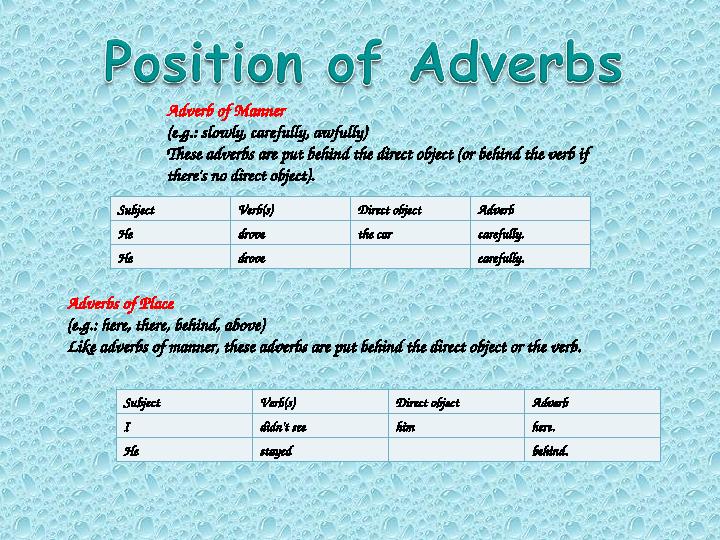
#10 слайд
Adverb of Manner
(e.g.: slowly, carefully, awfully)
These adverbs are put behind the direct object (or behind the verb if
there's no direct object).
Subject Verb(s) Direct object Adverb
He drove the car carefully.
He drove carefully.
Adverbs of Place
(e.g.: here, there, behind, above)
Like adverbs of manner, these adverbs are put behind the direct object or the verb.
Subject Verb(s) Direct object Adverb
I didn't see him here.
He stayed behind.
10 слайд
Adverb of Manner (e.g.: slowly, carefully, awfully) These adverbs are put behind the direct object (or behind the verb if there's no direct object). Subject Verb(s) Direct object Adverb He drove the car carefully. He drove carefully. Adverbs of Place (e.g.: here, there, behind, above) Like adverbs of manner, these adverbs are put behind the direct object or the verb. Subject Verb(s) Direct object Adverb I didn't see him here. He stayed behind.
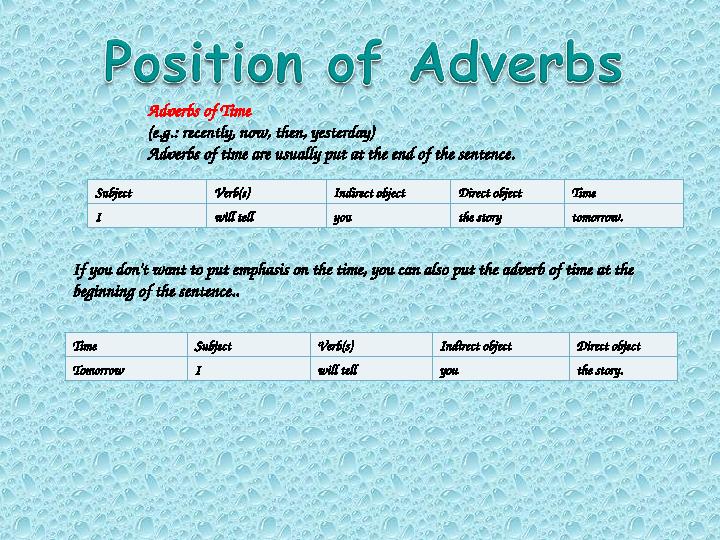
#11 слайд
Adverbs of Time
(e.g.: recently, now, then, yesterday)
Adverbs of time are usually put at the end of the sentence.
If you don't want to put emphasis on the time, you can also put the adverb of time at the
beginning of the sentence..
Subject Verb(s) Indirect objectDirect objectTime
I will tell you the story tomorrow.
Time Subject Verb(s) Indirect object Direct object
Tomorrow I will tell you the story.
11 слайд
Adverbs of Time (e.g.: recently, now, then, yesterday) Adverbs of time are usually put at the end of the sentence. If you don't want to put emphasis on the time, you can also put the adverb of time at the beginning of the sentence.. Subject Verb(s) Indirect objectDirect objectTime I will tell you the story tomorrow. Time Subject Verb(s) Indirect object Direct object Tomorrow I will tell you the story.
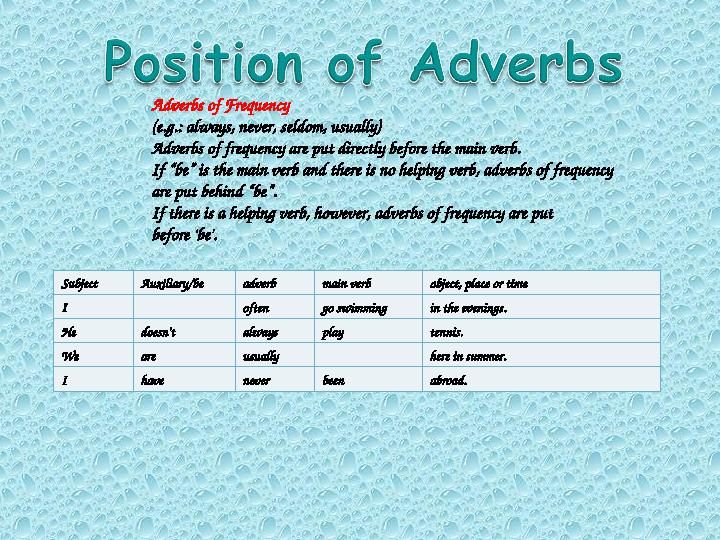
#12 слайд
Adverbs of Frequency
(e.g.: always, never, seldom, usually)
Adverbs of frequency are put directly before the main verb.
If “be” is the main verb and there is no helping verb, adverbs of frequency
are put behind “be”.
If there is a helping verb, however, adverbs of frequency are put
before 'be'.
Subject Auxiliary/beadverb main verb object, place or time
I often go swimming in the evenings.
He doesn't always play tennis.
We are usually here in summer.
I have never been abroad.
12 слайд
Adverbs of Frequency (e.g.: always, never, seldom, usually) Adverbs of frequency are put directly before the main verb. If “be” is the main verb and there is no helping verb, adverbs of frequency are put behind “be”. If there is a helping verb, however, adverbs of frequency are put before 'be'. Subject Auxiliary/beadverb main verb object, place or time I often go swimming in the evenings. He doesn't always play tennis. We are usually here in summer. I have never been abroad.
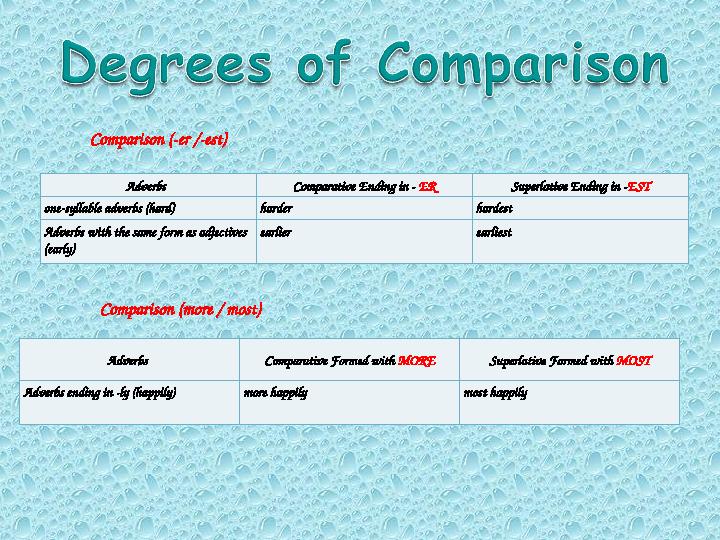
#13 слайд
Comparison (-er /-est)
Adverbs Comparative Ending in - ER Superlative Ending in -EST
one-syllable adverbs (hard)harder hardest
Adverbs with the same form as adjectives
(early)
earlier earliest
Comparison (more / most)
Adverbs Comparative Formed with MORE Superlative Formed with MOST
Adverbs ending in -ly (happily)more happily most happily
13 слайд
Comparison (-er /-est) Adverbs Comparative Ending in - ER Superlative Ending in -EST one-syllable adverbs (hard)harder hardest Adverbs with the same form as adjectives (early) earlier earliest Comparison (more / most) Adverbs Comparative Formed with MORE Superlative Formed with MOST Adverbs ending in -ly (happily)more happily most happily
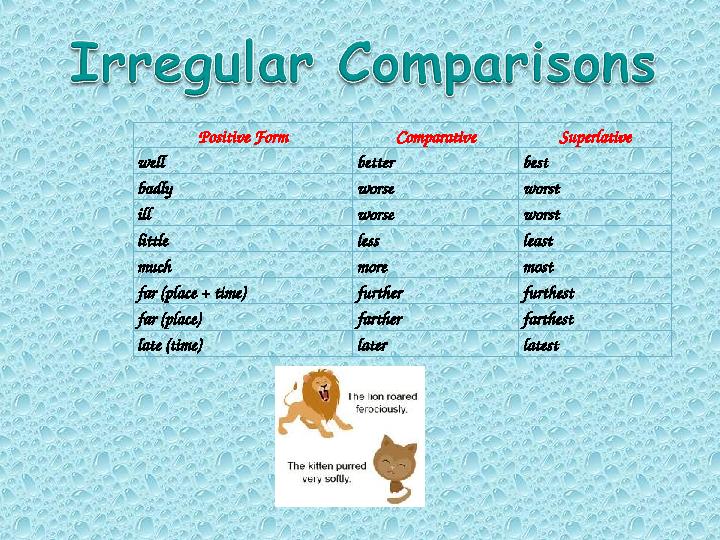
#14 слайд
Positive Form Comparative Superlative
well better best
badly worse worst
ill worse worst
little less least
much more most
far (place + time) further furthest
far (place) farther farthest
late (time) later latest
14 слайд
Positive Form Comparative Superlative well better best badly worse worst ill worse worst little less least much more most far (place + time) further furthest far (place) farther farthest late (time) later latest
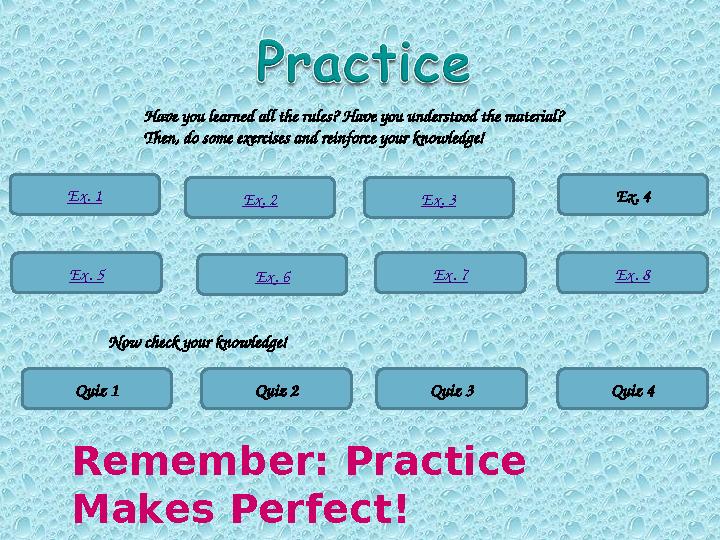
#15 слайд
Ex. 1 Ex. 2
Ex. 5 Ex. 6 Ex. 7 Ex. 8
Ex. 3 Ex. 4
Have you learned all the rules? Have you understood the material?
Then, do some exercises and reinforce your knowledge!
Quiz 1 Quiz 2 Quiz 3 Quiz 4
Now check your knowledge!
Remember: Practice
Makes Perfect!
15 слайд
Ex. 1 Ex. 2 Ex. 5 Ex. 6 Ex. 7 Ex. 8 Ex. 3 Ex. 4 Have you learned all the rules? Have you understood the material? Then, do some exercises and reinforce your knowledge! Quiz 1 Quiz 2 Quiz 3 Quiz 4 Now check your knowledge! Remember: Practice Makes Perfect!

шағым қалдыра аласыз
















